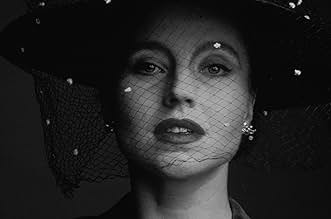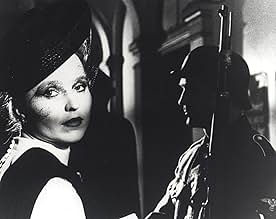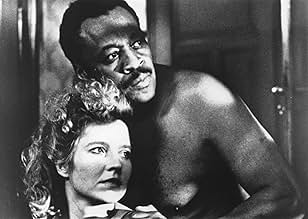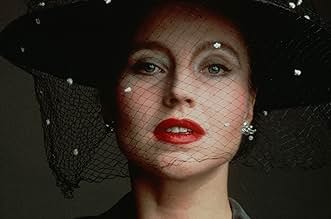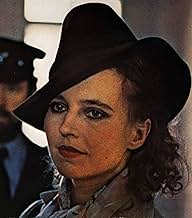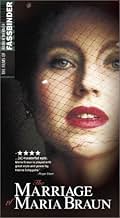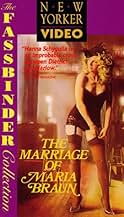IMDb-BEWERTUNG
7,7/10
15.749
IHRE BEWERTUNG
Eine Witwe aus dem Zweiten Weltkrieg versucht, sich an das Leben im Nachkriegsdeutschland anzupassen.Eine Witwe aus dem Zweiten Weltkrieg versucht, sich an das Leben im Nachkriegsdeutschland anzupassen.Eine Witwe aus dem Zweiten Weltkrieg versucht, sich an das Leben im Nachkriegsdeutschland anzupassen.
- Auszeichnungen
- 13 Gewinne & 7 Nominierungen insgesamt
George Eagles
- Bill
- (as George Byrd)
Günter Lamprecht
- Hans Wetzel
- (as Günther Lamprecht)
Empfohlene Bewertungen
We watched this film in our German Cinema class at university some years ago, and I still remember it well.
Without wishing to give too much away, it tells the tale of a woman who, seeing the desolate landscape that Germany was in 1945, determines to build herself a comfortable life and, as she does so, she becomes one of many women in Germany rebuilding the nation. This was a time, historically, when the women were a greater driving force in the social and economic rebuilding of the nation than were the men (who were both lacking in credibility following the horrors and the mess of the years past, and somewhat dazed by what the nation had just been through).
As she builds that life (and in so doing helps to rebuild the nation), however, she finds that she may have sacrificed too much.
It is a movie worth watching in order to gain some understanding of what life was like in Germany from 1945 to roughly 1970. Rainer Fassbinder makes use of images in places which show the transition of German society from broken ruins to economic superpower, the changing status of women in German society over that time period, the changing attitudes both within Germany and from outside toward Germany, and the sacrifices that women were prepared to make in order to build the Germany that they ultimately did. It also asks, though, if the single-minded pursuit of rebuilding the nation economically and materially did not take too much out of the nation and the people in other areas.
I enjoyed the movie, and am happy to recommend it.
Without wishing to give too much away, it tells the tale of a woman who, seeing the desolate landscape that Germany was in 1945, determines to build herself a comfortable life and, as she does so, she becomes one of many women in Germany rebuilding the nation. This was a time, historically, when the women were a greater driving force in the social and economic rebuilding of the nation than were the men (who were both lacking in credibility following the horrors and the mess of the years past, and somewhat dazed by what the nation had just been through).
As she builds that life (and in so doing helps to rebuild the nation), however, she finds that she may have sacrificed too much.
It is a movie worth watching in order to gain some understanding of what life was like in Germany from 1945 to roughly 1970. Rainer Fassbinder makes use of images in places which show the transition of German society from broken ruins to economic superpower, the changing status of women in German society over that time period, the changing attitudes both within Germany and from outside toward Germany, and the sacrifices that women were prepared to make in order to build the Germany that they ultimately did. It also asks, though, if the single-minded pursuit of rebuilding the nation economically and materially did not take too much out of the nation and the people in other areas.
I enjoyed the movie, and am happy to recommend it.
Having heard of this film for years, I didn't see it until 2003! Perhaps it's just as well that I waited. It is one of the finest films of its type -- post WW2 in Germany -- that I've ever seen; perhaps on balance the finest.
It seems to me that rather than being a cynical portrayal of those difficult years, it is more truthful and revelatory in a deep way. I imagine that no one other than those who lived then can begin to tell the story, which is why Fassbinder has tried on our behalf -- to try to convey to us the angst, the frustrations, the sadness, the insanity, the querulousness, the fragile hope of that era.
I find the story very sad, of course, because in my early-21st century psyche I'm more tuned into the love story than I am the tale of the sociology and social psychology of an era that occurred when I was very young. It seems to me that if one views the characters as representatives of some of the major "world views" obtaining during the reconstruction period, one sees a few of the many different human reactions there can be to such an experience: Many feel burned out and can't feel hope any longer; others, like Maria, feel there is at least money and position to be gained under the new dispensation; some simply don't care; others try to feed off the experience without contributing; and so on and so forth.
It also occurred to me that, at age 60, I may be in a position to appreciate this film more, and certainly to be more understanding of and sympathetic with the characters/types portrayed. I found each of them to have an important story to tell, whether it was a "good" story or not. And the character of the Black US Army Sergeant, while tragic at the end, was itself an essay in human relations that has to embarrass most Americans -- the fleeting moments when he and Maria found joy and pleasant times together were just wonderful to behold, and an indictment of our sad history in that regard.
View it and see what you think!
It seems to me that rather than being a cynical portrayal of those difficult years, it is more truthful and revelatory in a deep way. I imagine that no one other than those who lived then can begin to tell the story, which is why Fassbinder has tried on our behalf -- to try to convey to us the angst, the frustrations, the sadness, the insanity, the querulousness, the fragile hope of that era.
I find the story very sad, of course, because in my early-21st century psyche I'm more tuned into the love story than I am the tale of the sociology and social psychology of an era that occurred when I was very young. It seems to me that if one views the characters as representatives of some of the major "world views" obtaining during the reconstruction period, one sees a few of the many different human reactions there can be to such an experience: Many feel burned out and can't feel hope any longer; others, like Maria, feel there is at least money and position to be gained under the new dispensation; some simply don't care; others try to feed off the experience without contributing; and so on and so forth.
It also occurred to me that, at age 60, I may be in a position to appreciate this film more, and certainly to be more understanding of and sympathetic with the characters/types portrayed. I found each of them to have an important story to tell, whether it was a "good" story or not. And the character of the Black US Army Sergeant, while tragic at the end, was itself an essay in human relations that has to embarrass most Americans -- the fleeting moments when he and Maria found joy and pleasant times together were just wonderful to behold, and an indictment of our sad history in that regard.
View it and see what you think!
There is a strong resemblance of 'Maria Braun' to Curtiz' noirish 'Mildred Pierce'. While Mildred rebuilds her life after a personal tragedy, so does Maria, albeit in the backdrop of the post-war German economic disaster. Just as Mildred's loyalty was to her daughter, for Maria it was her husband Hermann (her man?). The two make sacrifices for each other hoping to build a better life for themselves. The major difference is that Maria's husband is a much more sympathetic character than Mildred's daughter, which robs the movie of some tension. Of course since Maria herself is not a very likeable person, one doesn't feel too much for her.
The story in a nutshell is of almost war widow Maria Braun rebuilding her life in post war Germany & rising high on the corporate ladder till she realises that she has given too much of herself for the climb to enjoy the cause she was climbing for.
Standing by itself, I still think this movie will appeal either to European baby boomers or serious students of Fasbinder. The narrative is straight forward & the final TV audio track is a brilliant touch. Hanna Schygulla as Maria gives yet another great performance for Fasbinder.
The story in a nutshell is of almost war widow Maria Braun rebuilding her life in post war Germany & rising high on the corporate ladder till she realises that she has given too much of herself for the climb to enjoy the cause she was climbing for.
Standing by itself, I still think this movie will appeal either to European baby boomers or serious students of Fasbinder. The narrative is straight forward & the final TV audio track is a brilliant touch. Hanna Schygulla as Maria gives yet another great performance for Fasbinder.
First and best of Fassbinder's Post-WWII "Wirtschaftswunder" films. His lead character, a young woman, determined to emerge out of Germany's WWII ruins as a success, literally "walks over corpses" to get what she wants. Marrying a man doomed to be among the last to "fall" for the Fuehrer and the German Reich, Maria is now "Frau" instead of "Fraulein". Initially searching for her MIA husband, she eventually gives it up and moves on. Climbing the ladder, Maria Braun has her share of good times. Showering her impoverished family with lavish presents and lifting everyone's life-style up by a notch, Maria becomes the celebrated "Wunderkind" who gets whatever she wants. Although her uppity attitude isn't always popular, and there is plenty of talk about Maria (and her "ways"), Maria Braun laughs it all away. The Marlene Dietrich-like heroine always has the last laugh, as the shocking ending proves.
This is a Modern Classic, one of the very best films to come out of the 1970s/80s German Cinema. Much stronger than "Veronica Foss" and in the league of "Das Boot", "The Marriage of Maria Braun" is a product of Modern German Dramatic Cinema's golden age. No sugar coating, just pure, unadulterated truth as seen through the rear-view mirror of people who have lived the horrors and survived into new tomorrows. A true gem of a film!
This is a Modern Classic, one of the very best films to come out of the 1970s/80s German Cinema. Much stronger than "Veronica Foss" and in the league of "Das Boot", "The Marriage of Maria Braun" is a product of Modern German Dramatic Cinema's golden age. No sugar coating, just pure, unadulterated truth as seen through the rear-view mirror of people who have lived the horrors and survived into new tomorrows. A true gem of a film!
Sensual and tough Maria Braun. (Hanna Schygula) marries a soldier in the middle of World War II and spends a half of day and the whole night with him. That's how long her marriage lasts before she loses him to the war and then to prison. She carries on with her life, becomes a successful businesswoman being not only sensual but intelligent, ambitious, and willing to use sex whenever or wherever necessary: "I don't know a thing about business, but I do know what German women want. You might even say I'm an expert on it". While climbing up to the success she always remembers her husband, Hermann (her man) and convinces herself that whatever she does is for him, for their future happy life together. "Maria Braun"'s style reminds much of melodramas by Fassbinder's favorite Hollywood director, Douglas Sirk and offers a glimpse of the loss and survival in postwar Germany. Hanna Schygula literally shines in every scene of the movie and she is fantastic.
8.5/10
8.5/10
Wusstest du schon
- WissenswertesInspired by "Mutter Courage und ihre Kinder" (1938/39), a play by Bertolt Brecht, and Baby Face (1933).
- PatzerAt the end of the cut of the two kids blowing up the firecrackers, they start laughing but no sound is heard. The sound of laughter is heard on the next cut after they get yelled at by the man scavenging for wood.
- Zitate
Maria Braun: I'm a master of deceit: a capitalist tool by day, and by night an agent of the proletarian masses - the Mata Hari of the Economic Miracle.
- Crazy CreditsAt the very end of the credits the following persons are 'credited' by their picture: Konrad Adenauer, Ludwig Erhard, Kurt Georg Kiesinger and Helmut Schmidt and a disconnected phone line can be heard.
- SoundtracksIn The Mood
Written by Wingy Manone, Andy Razaf and Joe Garland
Top-Auswahl
Melde dich zum Bewerten an und greife auf die Watchlist für personalisierte Empfehlungen zu.
- How long is The Marriage of Maria Braun?Powered by Alexa
Details
- Erscheinungsdatum
- Herkunftsland
- Offizielle Standorte
- Sprachen
- Auch bekannt als
- The Marriage of Maria Braun
- Drehorte
- Produktionsfirmen
- Weitere beteiligte Unternehmen bei IMDbPro anzeigen
Box Office
- Budget
- 1.975.000 DM (geschätzt)
- Bruttoertrag in den USA und Kanada
- 8.144 $
- Eröffnungswochenende in den USA und in Kanada
- 11.623 $
- 16. Feb. 2003
- Weltweiter Bruttoertrag
- 11.869 $
Zu dieser Seite beitragen
Bearbeitung vorschlagen oder fehlenden Inhalt hinzufügen

Oberste Lücke
By what name was Die Ehe der Maria Braun (1979) officially released in India in English?
Antwort

